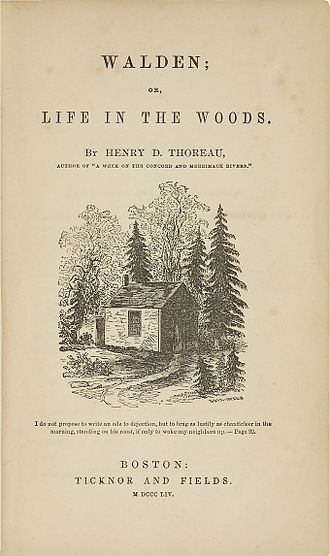
Nancy Ironside chose Thoreau’s Walden.
Henry Davis Thoreau’s Walden is an American Classic, usually part of a college English course – revered but unread.
At this time during the pandemic, many of us rely on nature to help us cope. I thought we could relate to Thoreau’s writings when he withdrew from the world. For this reason, I chose Walden for the August Nature Book of the Month. A very bad choice.
First the Facts. Thoreau was born in 1817 in Concord Massachusetts In 1833 he entered Harvard Collège. In 1845 begins his Walden experience in March (age 28) and takes residence there on July 4. He leaves Walden in September 6, 1847. He died in 1862 in Concord, of tuberculosis, at age 44.
Emerson, independently wealthy, had developed a close relationship with the Thoreau and offered to let Thoreau squat on land that he owned near Walden Pond, where he could live simply. There he built the hut.
He begins by telling us his outlook on life. It may sound profound, and is often quoted, but is meaningless to me, and sometimes he was just wrong.
He builds the hut, largely through his own efforts, often using repurposed wood and nails. To live simply (and avoid housekeeping), he has only a kettle, a skillet and a frying pan, a dipper, a wash-bowl, two knives and forks, 2 cups, one spoon. He made only three wooden chairs, to discourage company.
He devotes his energies to the bean fields, eventually hoeing 7 miles of rows of beans. (He sells the excess for unusual expenses.) He is actually proud of the poor quality of his beans compared to those of his neighbor, who lives on a nearby pond. Thoreau feels superior, because, as he says, the farmer thinks only of “money, money, money”. Maybe the farmer feels satisfaction watching his crops grow, and maybe he is content contemplating nature beside his pond in the evening. How does Thoreau know what the farmer is thinking? Henry is so arrogant.
While sheltering from the lightning, Henry went into an abandoned, building, only to find it not abandoned, but occupied by a family of poor illiterate recent Irish immigrants – husband, wife and “several children”. The father had entered into a very poor bargain, where he exchanged work for the leaky shelter. As they stood under the driest spot, Thoreau inappropriately gave them his philosophy- to live simply in order to enjoy life. When the rain stopped, the father joined him fishing, but had no skill at it and caught only a few “fins”. Henry had a fair string, which he carried home. He had said earlier there were too many do-gooders, and obviously he wasn’t going to be one of them and give his nice catch to feed this family.
Not a nice man, and I came to really dislike him.
He truly is a knowledgeable and observant naturalist. He talks of the whip-poor-wills who are probably nesting near him, a phoebe who nested in his shed, a woodcock doing her broken-wing act to keep him from her brood. He describes the battle between the red ants and the black ants in his woodpile. It is a lot of reading for some interesting observations of nature.
It is a tough and unrewarding read. Not recommended.
This book is available at the Orillia Public Library or can be downloaded free as an e-book. It has never been out of print.
